American Guinea Pig: Your Ultimate Guide to a Furry Companion
Discover the diverse range of guinea pig breeds and their specific traits. You will Learn essential tips for maintaining the health and happiness of your american guinea pig!

Key Takeaways:
- American Guinea Pigs are one of the most popular guinea pig breeds, known for their smooth coat and friendly nature.
- Proper care, including a balanced diet and regular grooming, is essential for the health and happiness of your guinea pig.
- Understanding the unique needs and behaviors of guinea pigs can help you become a better pet owner and provide a loving home for your furry friend.
Introduction to American Guinea Pigs
American Piggies are an adorable breed among guinea pig enthusiasts. Known for their cute appearance, charming personalities, smooth coat, and friendly demeanor, these small animals make great pets for families and individuals alike. Originating from South America, domestic guinea pigs have been domesticated for centuries and have become a staple in many households around the world.
Guinea pigs, also known as cavies, are social creatures that thrive in the company of their own kind. Most piggies are herd animals, meaning they prefer to live in groups rather than alone. This social nature makes them excellent companions, as they enjoy interacting with both their human caretakers and other guinea pigs.
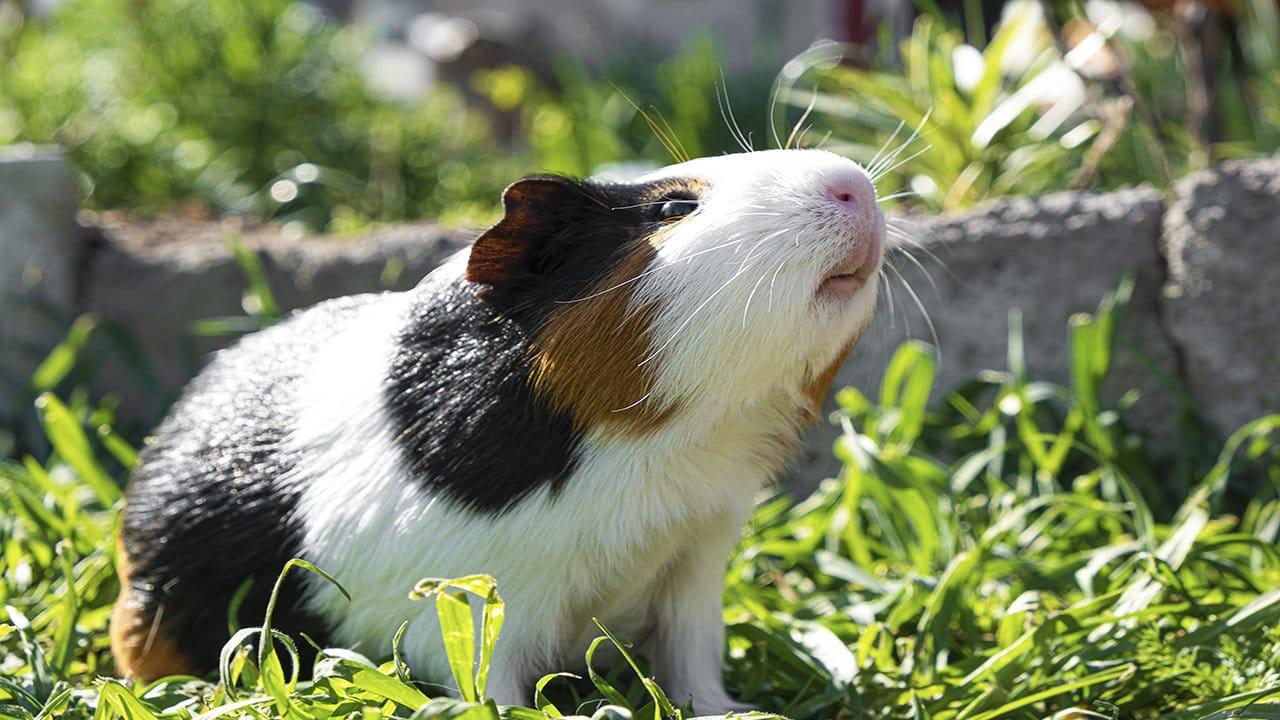
History and Origin
The history of guinea pigs dates back to ancient times in South America. Wild guinea pigs were first domesticated by the indigenous people of the Andes Mountains, who kept them for food and as pets. Over time, these small rodents spread to other parts of the world, becoming popular pets in Europe and North America. Guinea pigs have also been popular laboratory animals due to their adaptability and historical significance.
The American Guinea Pig, specifically, is considered the oldest domesticated breed, with a long history of domestication that traces back to its origins in South America. It was officially recognized by the American Cavy Breeders Association (ACBA) and has since become a favorite among guinea pig owners for its friendly nature and easy-to-care-for coat.
Physical Characteristics
American Guinea Pigs are known for their smooth, short coats, which can vary in length and texture among individuals. These coats may be dense, sleek, or even feature subtle variations, and require minimal grooming compared to breeds with longer or curly coats. American Guinea Pigs come in a variety of colors and patterns, including cream, which is recognized as a distinctive color option. They have a compact body, round ears, and a friendly expression that endears them to many pet owners. Unlike some other guinea pig breeds, American Guinea Pigs do not require extensive grooming, making them a low-maintenance option for those new to guinea pig care.
Guinea pigs tend to have size differences between males and females, and American Guinea Pigs are no exception. These guinea pigs typically weigh between 1.5 to 2.5 pounds and measure around 8 to 12 inches in length. Their small size and gentle nature make them suitable for children and adults alike, providing endless hours of companionship and entertainment.
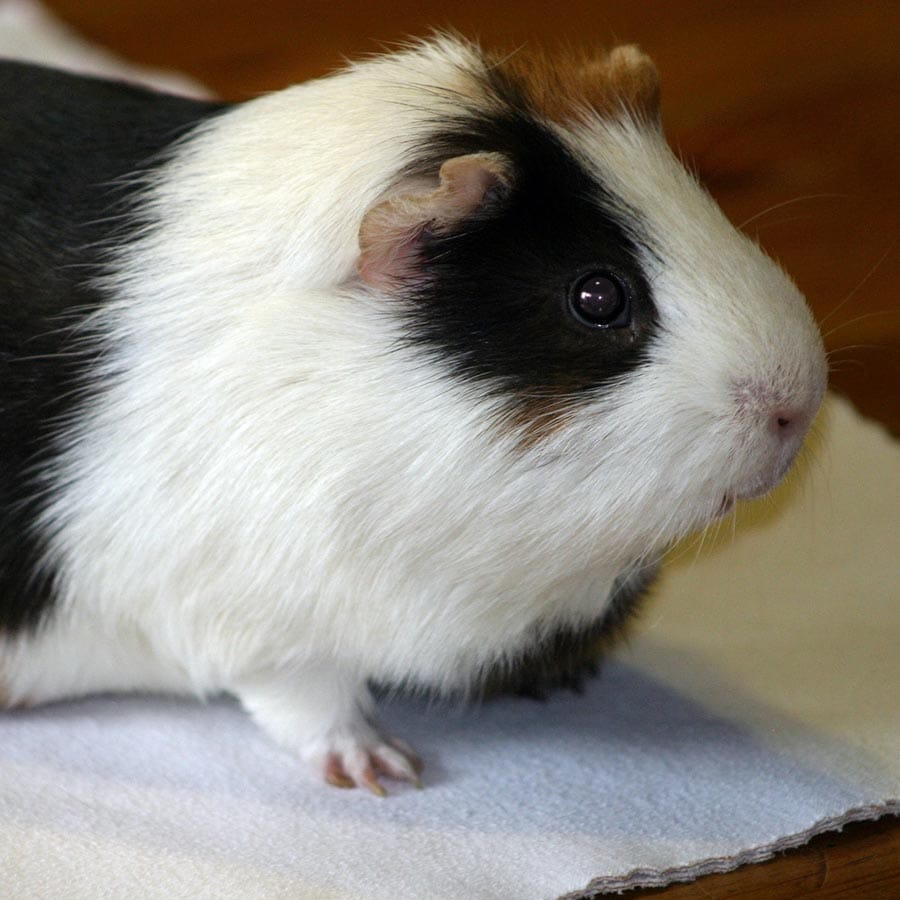
Personality and Behavior
One of the most appealing aspects of American Guinea Pigs is their curious personality. They are known for being friendly, social, and interactive, often seeking out attention from their human caretakers. American Guinea Pigs enjoy interacting with humans, showing affection and forming strong bonds with people. This makes them great pets for families, as they enjoy being handled and played with. Several guinea pigs have gained significant attention on social media due to their cute and friendly nature.
Guinea pigs are also known for their vocalizations, which they use to communicate with each other and with their owners. They make a variety of sounds, including purring, chirping, and squeaking, each with its own meaning. Understanding these sounds can help you better connect with your guinea pig and respond to their needs.
Native Habitat and Social Structure
Guinea pigs are native to South America, specifically the Andes mountains, where they inhabit grasslands, savannas, and rocky areas. Historically, guinea pigs have been raised as livestock in these regions, serving as an important source of food and holding cultural significance for local communities. In the wild, they live in small groups, called “herds,” which are typically led by a dominant male. These social structures are essential for their survival, as they provide protection, food, and companionship.
In captivity, guinea pigs can thrive in a well-designed enclosure that mimics their natural habitat. A spacious cage with hiding places, toys, and social interaction is crucial for their physical and mental well-being. Guinea pigs are social animals and prefer to live in pairs or groups, but introducing new guinea pigs to each other requires careful planning and supervision to avoid conflicts.
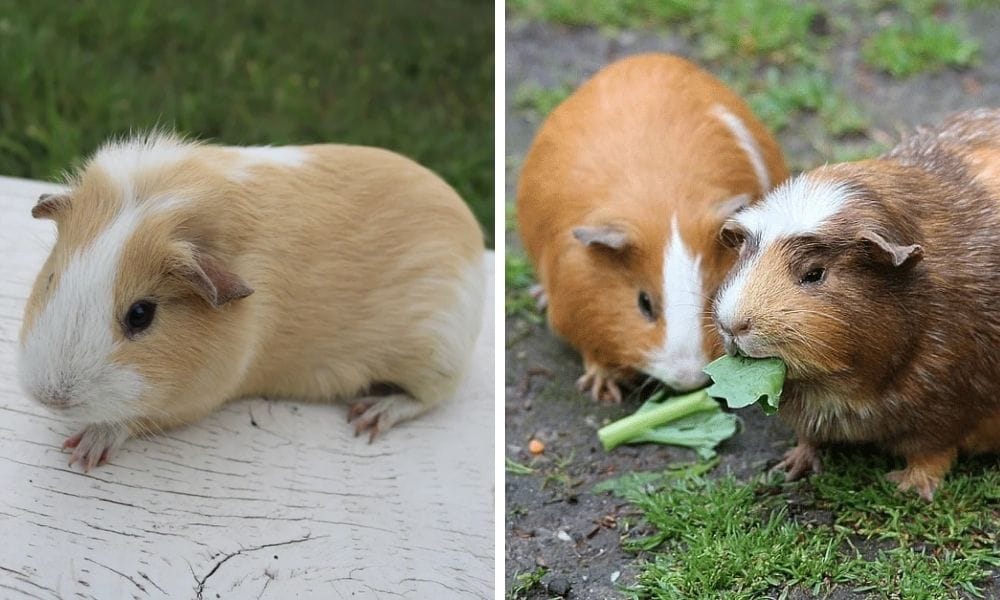
Housing and Environment
Creating a comfortable and safe environment for your American Piggie is crucial for their well-being. A spacious cage with plenty of room to move around is essential. The cage should be lined with soft bedding, such as paper-based or fleece, to provide a comfortable resting place.
It is important to include proper food bowls as essential accessories in the cage setup, ensuring your guinea pig has access to their diet in a clean and controlled manner.
Guinea pigs also need a variety of hiding spots and tunnels to explore, as they are prey animals and feel safer with places to hide. Providing a guinea pig-proof environment with plenty of enrichment activities will keep your pet happy and engaged.
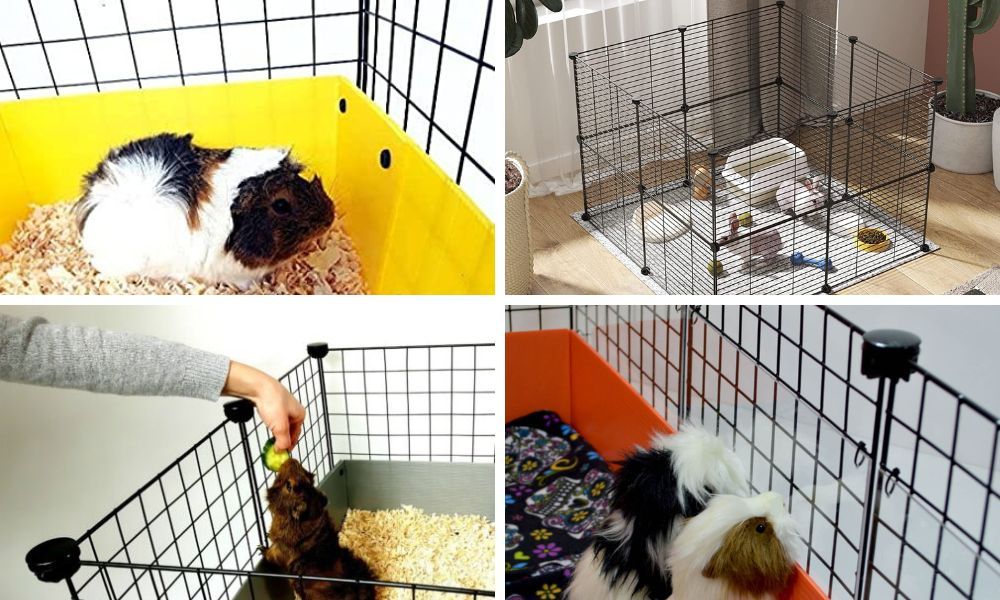
Cage Setup and Accessories
When setting up a cage for your guinea pig, consider the following essentials:
- A large, escape-proof enclosure with a solid bottom (wire mesh can harm their feet)
- A hiding place or two, such as tunnels or boxes
- A variety of toys, including chew toys, balls, and interactive toys
- A food dish and water bottle
- A hiding place for food and hay to encourage foraging
- A temperature range of 65-75°F (18-24°C) and humidity levels between 50-60%
Avoid placing the cage in direct sunlight, drafts, or near loud noises. Guinea pigs are sensitive to temperature fluctuations and noise, so it’s essential to provide a stable and comfortable environment.
Diet and Nutrition
A balanced diet is essential for the health of your American Piggie. Their diet should consist mainly of high-quality timothy hay, which provides the necessary fiber for their digestive system. Fresh vegetables, such as bell peppers, carrots, and leafy greens, should also be included to provide essential vitamins and minerals. Healthy treats can also be offered in moderation as part of their enrichment routine, providing both nutrition and mental stimulation.
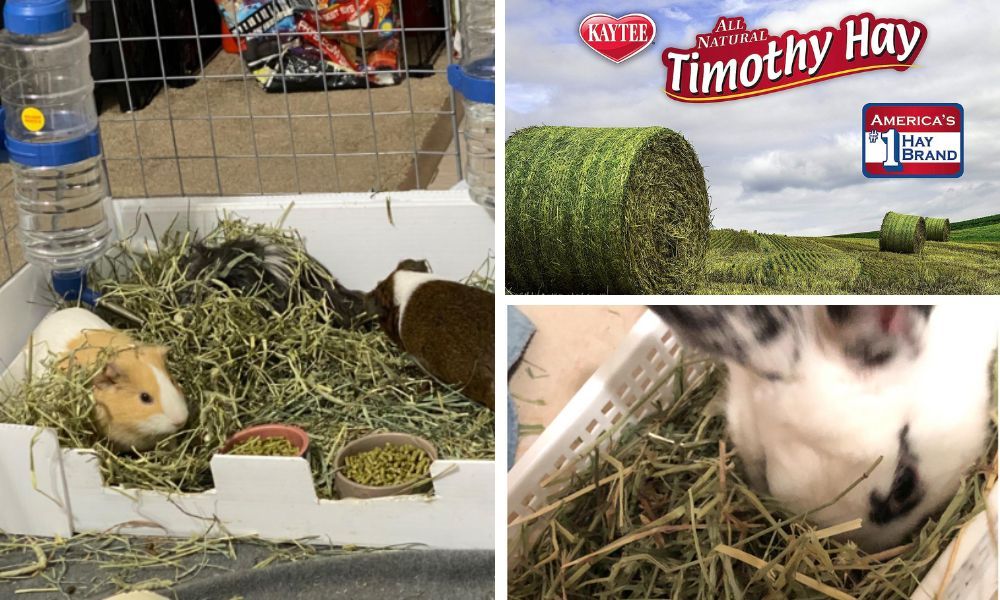
Vitamin C is particularly important for guinea pigs, as they cannot produce it on their own. Providing a constant supply of fresh vegetables rich in vitamin C, as well as a vitamin C supplement if needed, will help prevent deficiencies and keep your guinea pig healthy.
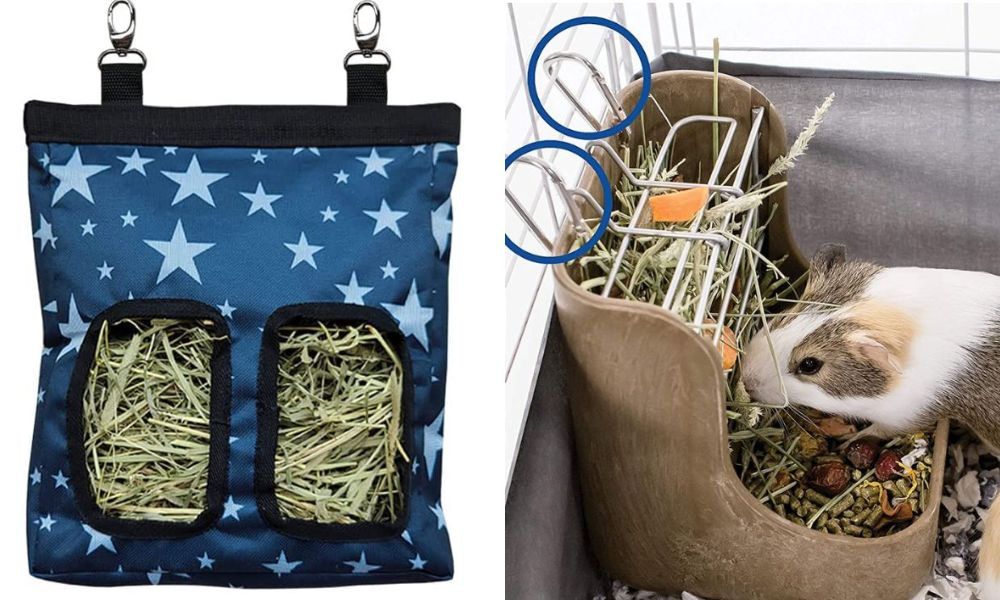
Grooming and Care
While American Guinea Pigs have a smooth coat that requires less grooming than long-haired breeds, regular care is still important. Abyssinian guinea pigs, on the other hand, are considered higher maintenance due to their rougher coat and increased grooming needs, which may require more frequent grooming. Brushing your guinea pig once a week will help remove loose hair and keep their coat looking its best. Regular nail trimming is also necessary to prevent overgrowth and discomfort.
In addition to grooming, regular health checks are essential. Keep an eye out for any signs of illness, such as changes in appetite, weight loss, or unusual behavior. If you notice any health problems, it is important to consult a vet immediately to ensure your guinea pig receives the care they need.
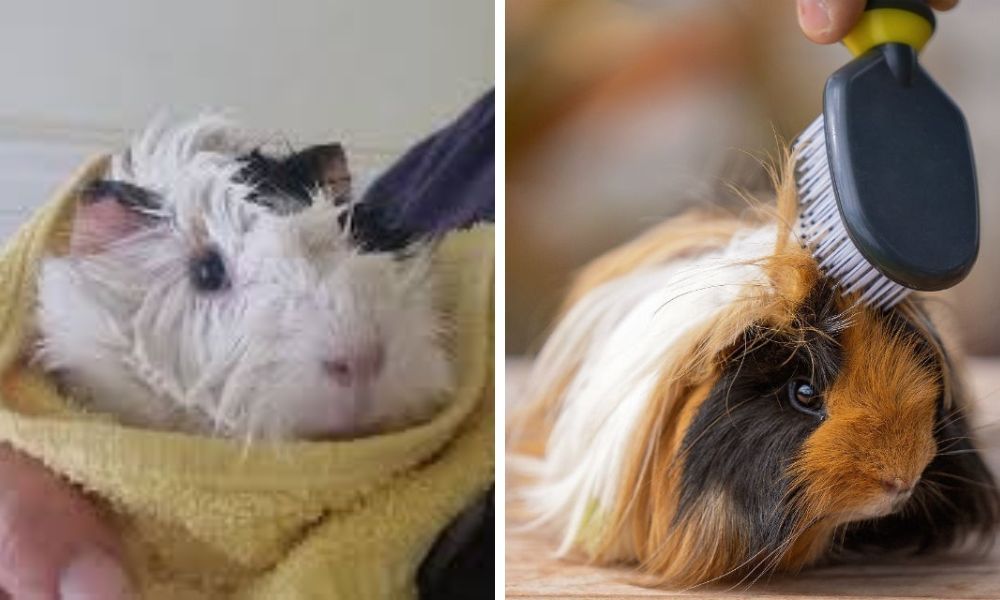
Common Health Issues
Like all pets, American Guinea Pigs can be prone to certain health issues. Some common problems include respiratory infections, dental issues, and skin conditions. Regular veterinary check-ups and a proper diet can help prevent many of these issues.
Vitamin C deficiency is a common problem in guinea pigs, leading to a condition known as scurvy. Symptoms include lethargy, swollen joints, and a rough coat. Ensuring your guinea pig receives enough vitamin C through their diet and supplements can help prevent this condition.
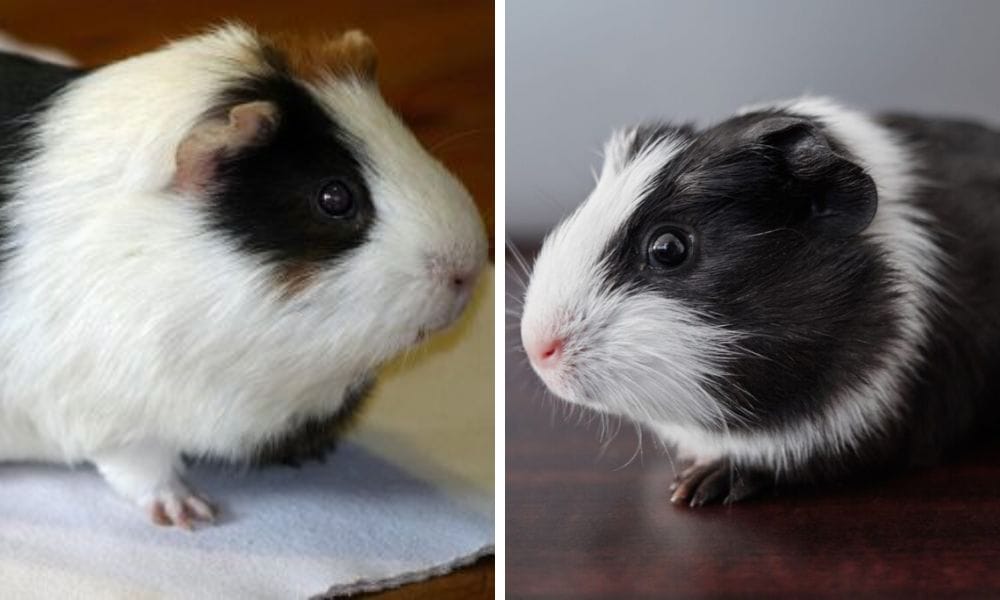
Breeding and Reproduction
Guinea pigs are often bred selectively to develop different breeds and characteristics, so breeding different breeds of guinea pigs should be approached with caution and careful planning. Female guinea pigs, also known as sows, can become pregnant as early as four weeks old, but it is recommended to wait until they are at least six months old to ensure they are physically mature enough for pregnancy.
Male guinea pigs, or boars, should also be mature before breeding. It is important to provide a safe and comfortable environment for the pregnant sow and to monitor her closely throughout the pregnancy. Guinea pigs typically have smaller litters, with an average of two to four pups per litter.
Socialization and Interaction
Socialization is key to a happy and well-adjusted guinea pig. American Guinea Pigs thrive on interaction with their human caretakers and other guinea pigs. Spending time with your guinea pig daily, handling them gently, and providing opportunities for play and exploration will help strengthen your bond.
Introducing new guinea pigs to each other should be done gradually and with care. Guinea pigs are social animals, but they can also be territorial. Providing a neutral space for introductions and monitoring their interactions can help ensure a smooth transition.
Piggy parents play a crucial role in socializing and bonding with their guinea pigs, helping them feel safe and loved.
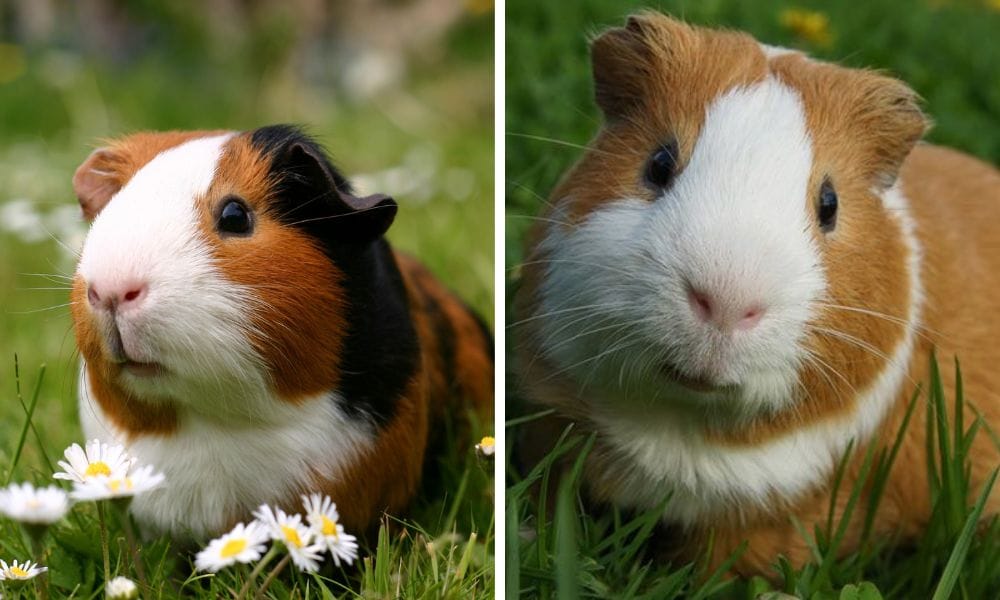
Training and Enrichment
Training your American Guinea Pig can be a fun and rewarding experience. While they may not be as trainable as dogs, guinea pigs can learn simple tricks and commands with patience and positive reinforcement. Teaching your guinea pig to come when called or to navigate a small obstacle course can provide mental stimulation and strengthen your bond.
Enrichment activities, such as providing toys, tunnels, and foraging opportunities, are also important for keeping your guinea pig engaged and happy. Rotating toys and changing up their environment can prevent boredom and encourage natural behaviors.
Taking care of your guinea pig means not only meeting their basic needs but also providing regular enrichment and training opportunities to support their well-being.
Choosing the Right Guinea Pig
When choosing a guinea pig, it is important to research common guinea pig breeds and their unique traits before making a decision. Consider their personality, health, and compatibility with your lifestyle. American Guinea Pigs are a great choice for first-time guinea pig owners due to their friendly nature and low-maintenance coat. However, it is important to spend time with potential pets to ensure they are healthy and well-socialized.
Adopting from a reputable breeder or rescue organization can help ensure you are getting a healthy and well-cared-for guinea pig. The American Cavy Breeders Association and the Humane Society are good resources for finding reputable breeders and adoption opportunities.
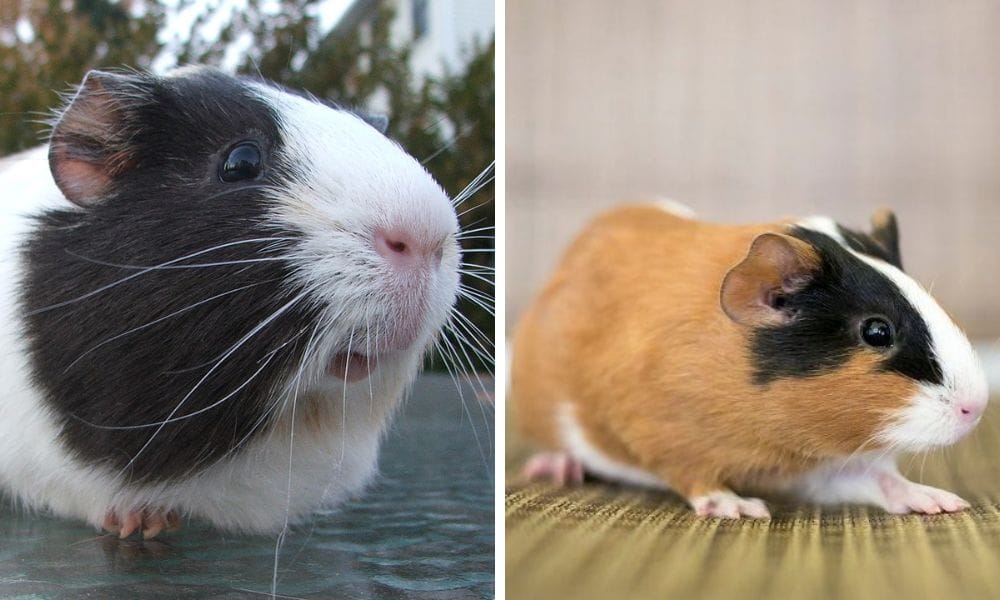
Understanding Guinea Pig Communication
Guinea pigs use a variety of vocalizations and body language to communicate with each other and with their human caretakers. Understanding these signals can help you better connect with your pet and respond to their needs. Common vocalizations include purring, which indicates contentment, and wheeking, which is often a sign of excitement or hunger.
Body language is also important. For example, a guinea pig that is lying down with its legs stretched out is likely feeling relaxed and comfortable, while a guinea pig that is hiding or showing signs of aggression may be stressed or frightened. Paying attention to these cues can help you create a more positive and supportive environment for your pet.
The Importance of Companionship
Guinea pigs are social animals that thrive in the company of their own kind. Keeping multiple guinea pigs together can provide them with the social interaction they need to stay happy and healthy. It is important to choose compatible guinea pigs and to provide a spacious and enriched environment to prevent conflicts.
If you are only able to keep a single guinea pig, it is important to spend extra time interacting with them to provide the social stimulation they need. Regular handling, playtime, and enrichment activities can help ensure your guinea pig remains happy and well-adjusted.
Guinea Pig Proofing Your Home
Creating a safe environment for your guinea pig involves more than just providing a comfortable cage. Guinea pig proofing your home means ensuring that any areas your guinea pig has access to are free from hazards. This includes securing electrical cords, removing toxic plants, and ensuring that any small objects that could be swallowed are out of reach.
Providing a designated play area with plenty of toys and hiding spots can also help keep your guinea pig safe and entertained. Regularly inspecting your home for potential hazards and making necessary adjustments can help prevent accidents and keep your guinea pig safe.
The Role of the American Cavy Breeders Association
The American Cavy Breeders Association (ACBA) plays a crucial role in promoting the health and well-being of guinea pigs. The ACBA sets standards for guinea pig breeds, provides resources for breeders and pet owners, and promotes responsible breeding practices. By supporting the ACBA and following their guidelines, you can help ensure the health and happiness of your guinea pig.
The ACBA also hosts events and shows where guinea pig enthusiasts can showcase their pets and learn more about guinea pig care and breeding. Participating in these events can be a great way to connect with other guinea pig owners and learn more about this wonderful pet.
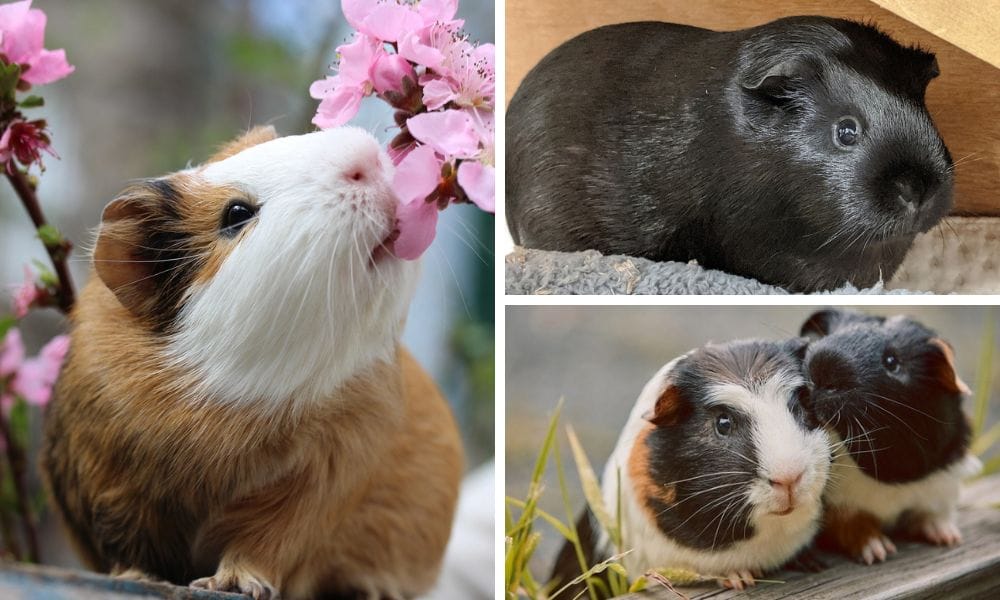
Popular Guinea Pig Breeds
In addition to the American Guinea Pig, there are several other popular breeds to consider. The Abyssinian Guinea Pig is known for its distinctive rosettes and playful personality. Peruvian guinea pigs are famous for their long, flowing locks of silky fur, which require regular grooming to maintain their impressive coat and unique appearance. The Merino Guinea Pig is characterized by its curly, dense, and soft coat, and it has a calm and friendly personality, making it an ideal pet for many. The Teddy Guinea Pig has a dense, plush coat that gives it a teddy bear-like appearance. The White Crested Guinea Pig is distinct with its unique crest of white fur on the forehead and smooth coat, and it is known for its sociable nature.
Other breeds include the Texel Guinea Pig, with its medium to long hair length that is wavy or curly and requires regular grooming, and the Coronet Guinea Pig, which has a crest of hair on its head. Rex guinea pigs are recognized for their wiry, dense fur that stands upright and their gentle temperament, making them a low-maintenance choice. The silkie guinea pig features long, straight, and sleek fur that needs daily grooming to prevent matting and staining, and is known for its affectionate nature. Each breed has its own unique characteristics and care requirements, so it is important to choose a breed that fits your lifestyle and preferences.
The Unique Needs of Hairless Breeds
Skinny pigs, a unique breed of nearly hairless guinea pigs, have specific care requirements compared to their furred counterparts. These guinea pigs have little to no hair, making them more susceptible to temperature changes and skin issues. The Baldwin breed, in particular, is completely hairless, with few to no hairs on their nose except for whiskers, which highlights their distinctive appearance. Providing a warm and draft-free environment is essential for their well-being.
Regular skin care is also important for skinny pigs. This includes gentle cleaning to remove any dirt or oils and applying a moisturizer if needed to prevent dry skin. Hairless guinea pigs also require a higher calorie diet to help maintain their body temperature, so it is important to provide a balanced diet with plenty of fresh vegetables and high-quality pellets.
The Role of the British Cavy Council
The British Cavy Council (BCC) is another important organization that promotes the health and well-being of guinea pigs. The BCC sets standards for guinea pig breeds, provides resources for breeders and pet owners, and promotes responsible breeding practices. By supporting the BCC and following their guidelines, you can help ensure the health and happiness of your guinea pig.
The BCC also hosts events and shows where guinea pig enthusiasts can showcase their pets and learn more about guinea pig care and breeding. Participating in these events can be a great way to connect with other guinea pig owners and learn more about this wonderful pet.
The Importance of a Balanced Diet
A balanced diet is essential for the health and well-being of your guinea pig. In addition to timothy hay and fresh vegetables, guinea pigs also need a high-quality pellet food that is specifically formulated for their nutritional needs. Avoid feeding your guinea pig foods that are high in sugar or fat, as these can lead to obesity and other health issues.
Providing a constant supply of fresh water is also important. Use a water bottle with a sipper tube to keep the water clean and prevent spills. Regularly check the water bottle to ensure it is working properly and refill it as needed.
The Role of Selective Breeding
Selective breeding plays a crucial role in maintaining the health and quality of guinea pig breeds. Responsible breeders carefully select breeding pairs based on their health, temperament, and conformation to breed standards. This helps ensure that the offspring are healthy and meet the breed standards set by organizations like the ACBA and BCC.
Selective breeding also helps preserve the unique characteristics of each breed, such as coat type, color, and personality. By supporting responsible breeders and following their guidelines, you can help ensure the health and happiness of your guinea pig.
The Benefits of Adopting
Adopting a guinea pig from a rescue organization or shelter can be a rewarding experience. Many guinea pigs in shelters are in need of loving homes, and adopting can help provide a second chance for these animals. Rescue organizations often have a variety of guinea pigs available for adoption, including different breeds and ages.
Adopting also helps reduce the demand for guinea pigs from pet stores and breeders, which can help reduce the number of guinea pigs in need of homes. By adopting, you can make a positive impact on the lives of guinea pigs and provide a loving home for a pet in need.
The Role of the Humane Society
The Humane Society plays a crucial role in promoting the welfare of guinea pigs and other animals. They provide resources and support for pet owners, promote responsible pet ownership, and work to prevent animal cruelty. By supporting the Humane Society and following their guidelines, you can help ensure the health and happiness of your guinea pig.
The Humane Society also offers adoption services, where you can find guinea pigs in need of loving homes. Adopting from the Humane Society can be a great way to provide a second chance for a guinea pig in need and make a positive impact on the lives of animals.
The Importance of Regular Vet Visits
Regular veterinary check-ups are essential for maintaining the health of your guinea pig. A vet who specializes in small animals can provide important health screenings, vaccinations, and treatments for any health issues that may arise. Regular check-ups can help catch potential health problems early and ensure your guinea pig receives the care they need.
In addition to regular check-ups, it is important to consult a vet immediately if you notice any signs of illness or unusual behavior in your guinea pig. Early intervention can make a big difference in the outcome of many health issues and help ensure your guinea pig stays healthy and happy.
The Role of Guinea Pigs in Research
Guinea pigs have a long history of being used as laboratory animals in scientific research. The montane guinea pig, a rare breed native to the Andes of South America, is noted for its adaptability in coat color based on geographic location and its ancestral role to the domesticated guinea pig. Their unique physiology and susceptibility to certain diseases make them valuable models for studying human health and disease. However, the use of guinea pigs in research has also raised ethical concerns, and there is ongoing debate about the welfare of laboratory animals.
Many researchers and organizations are working to improve the welfare of guinea pigs in research settings and to develop alternative methods that reduce the need for animal testing. By supporting these efforts and advocating for the humane treatment of laboratory animals, you can help promote the welfare of guinea pigs and other animals used in research.
The Importance of Enrichment
Enrichment is essential for the mental and physical well-being of your guinea pig. Providing a variety of toys, tunnels, and foraging opportunities can help keep your guinea pig engaged and prevent boredom. Rotating toys and changing up their environment can also encourage natural behaviors and provide mental stimulation.
In addition to physical enrichment, social interaction is also important. Spending time with your guinea pig daily, handling them gently, and providing opportunities for play and exploration can help strengthen your bond and keep your guinea pig happy and well-adjusted.
The Role of Guinea Pigs in Education
Guinea pigs can play a valuable role in education, helping teach children and adults about responsible pet ownership, animal care, and biology. Many schools and educational programs use guinea pigs as classroom pets, providing students with hands-on experience in caring for animals and learning about their needs and behaviors.
In addition to classroom settings, guinea pigs can also be used in educational outreach programs, visiting schools, libraries, and community centers to teach people about animal care and welfare. By promoting the use of guinea pigs in education, you can help raise awareness about the importance of responsible pet ownership and the welfare of animals.
The Importance of Socialization
Socialization is key to a happy and well-adjusted guinea pig. American Guinea Pigs thrive on interaction with their human caretakers and other guinea pigs. Spending time with your guinea pig daily, handling them gently, and providing opportunities for play and exploration will help strengthen your bond.
Introducing new guinea pigs to each other should be done gradually and with care. Guinea pigs are social animals, but they can also be territorial. Providing a neutral space for introductions and monitoring their interactions can help ensure a smooth transition.
The Role of Guinea Pigs in Therapy
Guinea pigs can also play a valuable role in therapy, providing comfort and companionship to people in need. Animal-assisted therapy programs often use guinea pigs to help individuals with physical, emotional, or mental health challenges. The gentle and friendly nature of guinea pigs makes them well-suited for this type of work.
In addition to formal therapy programs, guinea pigs can also provide emotional support and companionship to their owners. The simple act of caring for a guinea pig and spending time with them can have a positive impact on mental health and well-being.
The Importance of Understanding Guinea Pig Behavior
Understanding guinea pig behavior is essential for providing the best care for your pet. Guinea pigs use a variety of vocalizations and body language to communicate with each other and with their human caretakers. Common vocalizations include purring, which indicates contentment, and wheeking, which is often a sign of excitement or hunger.
Body language is also important. For example, a guinea pig that is lying down with its legs stretched out is likely feeling relaxed and comfortable, while a guinea pig that is hiding or showing signs of aggression may be stressed or frightened. Paying attention to these cues can help you create a more positive and supportive environment for your pet.
The Role of Guinea Pigs in Culture
Guinea pigs have played a significant role in the culture and traditions of many societies, particularly in South America. In the Andes Mountains, guinea pigs have been kept as pets and used as a source of food for centuries. They are also featured in traditional ceremonies and festivals, highlighting their importance in the culture.
In modern times, guinea pigs have become popular pets around the world, and their cultural significance continues to be celebrated. From children's books and movies to social media and online communities, guinea pigs have captured the hearts of people everywhere.
The Importance of Proper Handling
Proper handling is essential for the safety and well-being of your guinea pig. When picking up your guinea pig, it is important to support their entire body and avoid squeezing or dropping them. Gently scoop them up with both hands, supporting their chest and hindquarters, and hold them close to your body to provide a sense of security.
Regular handling can help your guinea pig become more comfortable with being picked up and can strengthen your bond. It is important to handle your guinea pig gently and with care, especially when introducing them to new people or environments.
The Role of Guinea Pigs in Science
Guinea pigs have made significant contributions to scientific research, particularly in the fields of medicine and biology. Their unique physiology and susceptibility to certain diseases make them valuable models for studying human health and disease. Research using guinea pigs has led to important discoveries in areas such as immunology, nutrition, and pharmacology.
While the use of guinea pigs in research has raised ethical concerns, many researchers
Characteristics and Needs of Male Guinea Pigs
Male guinea pigs, also known as boars, have distinct characteristics and needs. They are generally larger than females and have a more muscular build. Male guinea pigs are also more prone to aggression and dominance behaviors, especially if they are not neutered.
To care for a male guinea pig, consider the following:
- Provide a large enough enclosure to accommodate their size and energy level
- Offer plenty of hiding places and toys to reduce stress and boredom
- Ensure a balanced diet that includes high-quality hay, pellets, and fresh vegetables
- Provide regular social interaction and handling to reduce aggression
- Consider neutering to reduce dominance behaviors and prevent health issues
Tips for New Owners
Welcoming a new guinea pig into your family can be a rewarding experience, but it’s essential to be prepared. Here are some tips for new owners:
- Research, research, research: Learn about guinea pig behavior, diet, and health to provide the best possible care
- Prepare a suitable enclosure: Set up a spacious cage with hiding places, toys, and social interaction
- Choose the right guinea pig: Consider factors like age, size, and temperament when selecting a guinea pig
- Plan for veterinary care: Find a local veterinarian experienced in caring for guinea pigs and schedule regular check-ups
- Be patient: Guinea pigs can take time to adjust to their new environment, so be patient and give them space to settle in
Preparation and Expectations
Before bringing a guinea pig home, consider the following:
- Time commitment: Guinea pigs require regular social interaction, exercise, and cleaning of their enclosure
- Cost: Guinea pigs require a significant investment in food, toys, and veterinary care
- Space: Guinea pigs need a large enough enclosure to accommodate their size and energy level
- Noise: Guinea pigs can be loud, especially when they’re hungry or want attention
- Mess: Guinea pigs can be messy, so be prepared for regular cleaning of their enclosure
By understanding these factors, you can provide the best possible care for your guinea pig and enjoy a rewarding and loving relationship.

